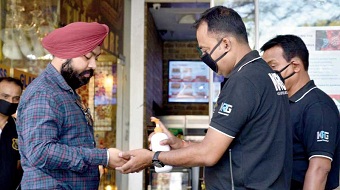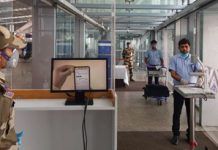Security agencies and residents’ welfare associations (RWAs) of housing complexes have raised concern why private guards, who have become an integral part of Covid management teams, have not been included in the essential services bracket. The inclusion would have made them eligible for free vaccination by the government and exempt from Covid-related restrictions. The guards are performing Covid duties like lifting stretchers outside hospitals, fumigation and helping suspected Covid patients get on or off ambulances in hospitals and housing complexes.
Officials of the Central Association of the Private Security Industry (CAPSI) have written to the state government seeking recognition of the guards as frontline workers. “Private security personnel are an integral part of the city’s security paraphernalia as they are needed everywhere – hospitals, banks, markets, institutions, housing complexes, vital installations…. The guards have been relentlessly performing their duties risking their lives like any frontline worker during the pandemic. Hence we have put up a request before the state to include them into the list of essential services and prioritise their vaccination,” said Satnam Singh Ahluwalia, secretary, CAPSI, Bengal.
Thousands of men and women who work as private guards have become lifelines at their workplaces by performing jobs beyond their call of duty or training. According to the chief of private security agency NIS, guards at hospitals are most vulnerable and exposed to a “huge quantum of risk.”
“From holding stretchers with bodies of deceased Covid patients to lending a helping hand to patients trying to step out of an ambulance, guards are risking their lives every day. They are expected to perform duties beyond that of a conventional guard.,” said Debajit Choudhury, Managing Director of NIS.
The majority of the guards have basic training in access control systems, patrolling duty, responding to emergencies, making primary enquiries and intervention in incidents of criminal nature and handling basic security tools like metal-frame detectors. However, in the past year, their job description has changed from protectors to facilitators, RWA officials said.
“From guarding gates to arranging doorstep deliveries for affected families to fumigation of buildings – the guards are doing everything. It is unfortunate that they have not been recognised as frontline workers and that is why they are also finding it difficult to commute during the lockdown. We have been able to retain the entire staff at our housing complex but that is not possible everywhere,” said an official of the Urbana housing complex, off Ruby hospital.








